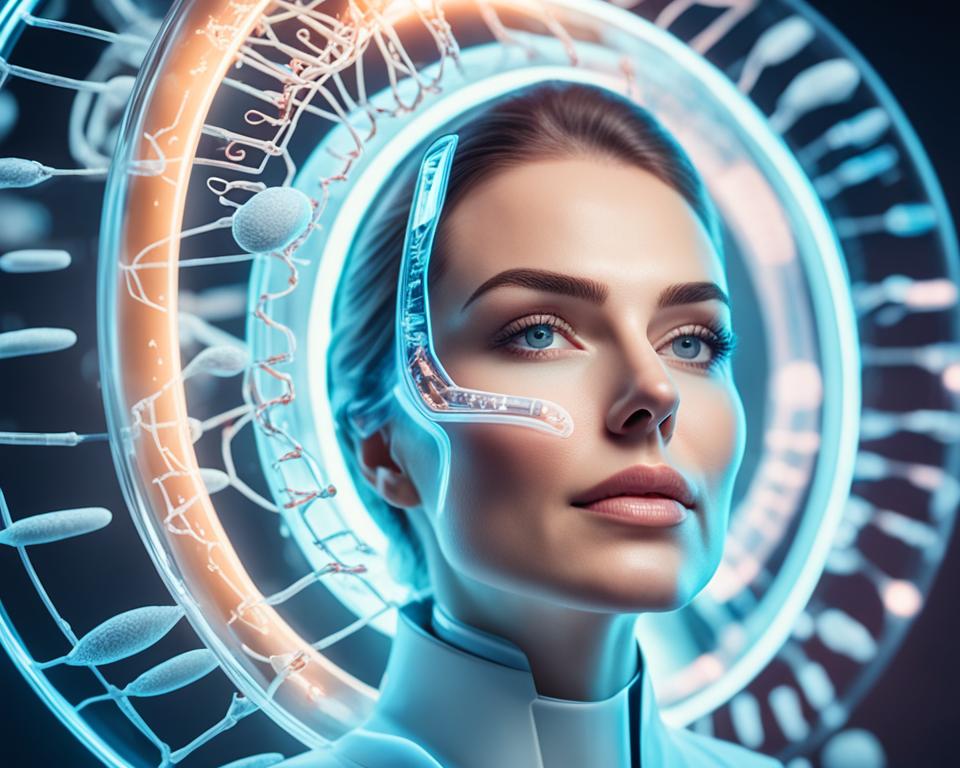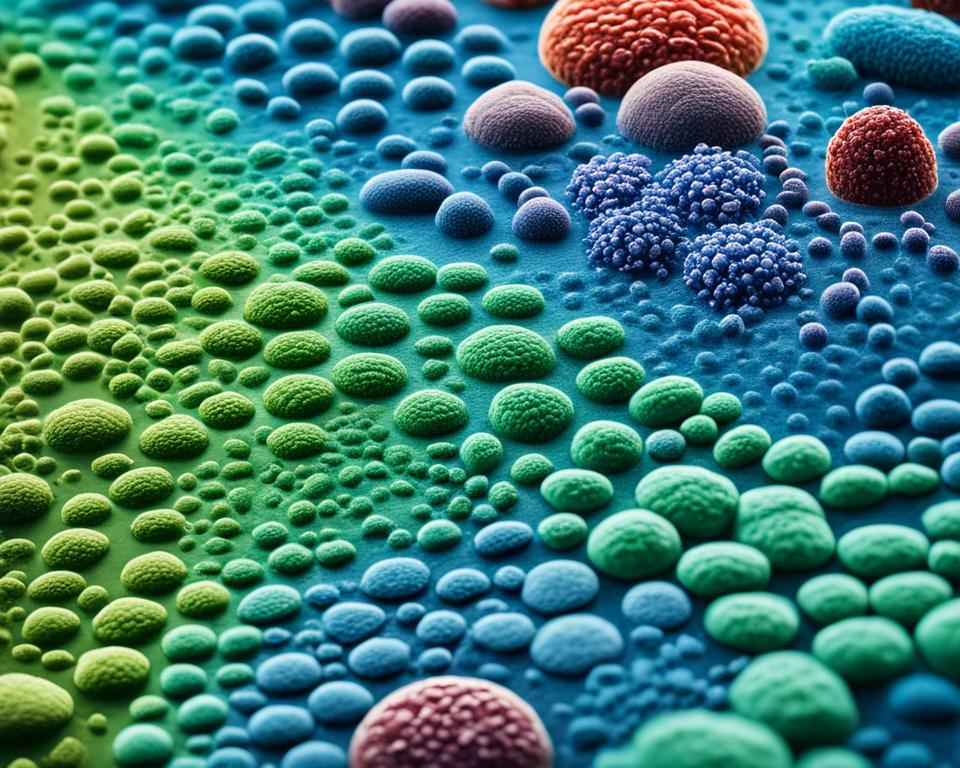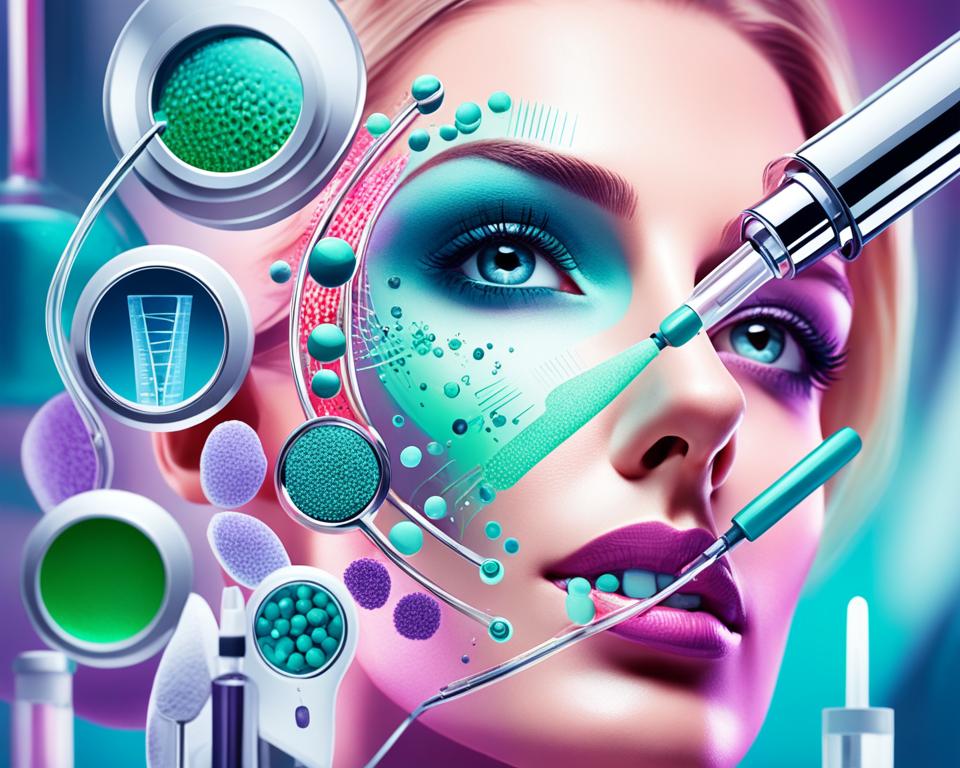As a copywriting journalist, I am excited to explore the groundbreaking advancements in next-generation skincare and the profound impact of biotechnology on beauty regimens. In recent years, the beauty industry has witnessed a remarkable fusion of beauty and science, revolutionizing the way we approach skincare and unlocking new possibilities for personalized, effective, and sustainable solutions.
Biotechnology, with its scientific breakthroughs and innovative applications, has become the driving force behind skincare innovation. From genetic engineering to molecular biology research, the intersection of biotechnology and beauty is reshaping the landscape of skincare.
In this article, we will delve into the fascinating world of next-generation skincare and uncover the various ways biotechnology is transforming beauty regimens. We will explore the use of genetic profiling for personalized skincare, the shift towards environmentally friendly lab-grown ingredients, the symbiosis of biopharmaceuticals and cosmetics, advancements in anti-aging treatments, the potential of gene editing, the role of molecular biology research in skin health, the power of DNA sequencing methods, and the bridging of medicine and cosmetics through biotech advancements.
Key Takeaways:
- Biotechnology is revolutionizing the beauty industry, blurring the boundaries between science and skincare.
- Personalized skincare through genetic profiling is becoming a popular trend, allowing for tailored solutions based on individual genetic information.
- The shift to lab-grown ingredients promotes sustainability and reduces the environmental impact of the beauty industry.
- The symbiotic relationship between biopharmaceuticals and cosmetics showcases the therapeutic potential of skincare products.
- Next-gen anti-aging treatments incorporate gene therapy techniques and advanced formulations for transformative results.
Exploring the Fusion of Beauty and Science
The beauty industry has witnessed a transformative evolution with the fusion of beauty and science. Incorporating the principles of biotechnology, skincare formulations have entered a new era, where scientific advancements and innovative ingredients combine to create next-generation beauty products. This article explores how the historical context of biotechnology in beauty has paved the way for the foundation of biotech in today’s skincare.
The Historical Context of Biotechnology in Beauty
The historical context of biotechnology in beauty dates back centuries, where ancient civilizations recognized the power of natural ingredients in enhancing their skincare routines. From Cleopatra’s legendary use of milk baths to the incorporation of plant extracts in traditional Ayurvedic practices, the beauty rituals of the past laid the foundation for the science-driven skincare of today.
As scientific knowledge expanded, researchers and skincare experts began harnessing the potential of biotechnology to revolutionize beauty regimens. The historical context showcases how advancements in molecular biology, genetics, and other scientific disciplines have shaped the beauty industry, setting the stage for the integration of science and beauty in modern times.
The Foundation of Biotech in Today’s Skincare
In today’s skincare landscape, the foundation of biotech is evident in the development of innovative ingredients and advanced delivery systems. Biotechnology-driven skincare formulations leverage cutting-edge research and scientific breakthroughs to address a range of skin concerns, from aging and hyperpigmentation to acne and sensitive skin.
By understanding the intricate mechanisms of skin biology, skincare brands can create targeted and highly effective products. Biotech encompasses various techniques like genetic engineering, gene editing, and DNA sequencing methods, enabling the creation of personalized skincare solutions that cater to individual skin needs.
Through the fusion of beauty and science, skincare has transcended traditional boundaries, offering consumers a new era of beauty that blends scientific expertise with luxurious self-care. This intersection propels the beauty industry forward, enhancing the efficacy and results of skincare products while meeting the evolving needs of consumers seeking science-backed solutions.
Biotechnology and Genetic Engineering in Skincare Innovation
Biotechnology and genetic engineering have transformed the field of skincare by leveraging the power of genetics to drive innovative solutions. These advancements have revolutionized the development of skincare products, leading to improved efficacy and targeted formulations to address specific skin concerns.
By utilizing biotechnology and genetic engineering, skincare companies can create new ingredients that harness the potential of genetic information. This allows for the development of cutting-edge formulations that cater to individual skin needs. The integration of biotechnology and genetic engineering in skincare innovation has opened up a new realm of possibilities for personalized and tailored skincare regimens.
“The integration of biotechnology and genetic engineering in skincare innovation has opened up a new realm of possibilities for personalized and tailored skincare regimens.”
One area where the impact of biotechnology and genetic engineering is particularly evident is in anti-aging skincare. These advancements have paved the way for next-generation anti-aging treatments that go beyond surface-level solutions. By targeting specific genes and utilizing gene therapy techniques, skincare products can now address the underlying causes of aging, offering more effective and long-lasting results.

Moreover, biotechnology and genetic engineering have allowed for the development of innovative delivery systems that enhance the penetration and absorption of skincare ingredients. By optimizing the delivery of active compounds, these technologies ensure that the skincare products can effectively reach their intended targets, maximizing their potential benefits for the skin.
In conclusion, the integration of biotechnology and genetic engineering in skincare innovation has revolutionized the industry, pushing the boundaries of what skincare can achieve. These advancements have led to the development of personalized skincare solutions, advanced anti-aging treatments, and enhanced delivery systems, offering consumers more effective and tailored products for their skin concerns.
Personalized Skincare: Genetic Profiling and Custom Solutions
Personalized skincare is a rapidly growing trend in the beauty industry, and it holds immense potential for addressing individual skin needs. Genetic profiling is at the forefront of this revolution, enabling the creation of customized skincare solutions tailored to an individual’s unique genetic makeup. By analyzing DNA technology and genetic information, skincare professionals can gain valuable insights into each person’s skin characteristics, allowing them to develop personalized skincare routines and recommend specific products for optimal results.
The role of DNA technology in tailored skincare is profound. By understanding an individual’s genetic profile, skincare experts can identify specific skin concerns, such as hyperpigmentation, acne, or aging, and design custom solutions to address these issues effectively. DNA technology also informs the selection of ingredients that are most compatible with an individual’s skin type and genetic predispositions, ensuring that the skincare regimen is optimized to produce the best possible outcomes.
To illustrate the transformative power of genetic modification in skincare, let’s explore some case studies. One notable example is the use of genetic profiling to develop personalized anti-aging treatments. By precisely targeting the genes associated with aging, scientists have been able to create customized skincare formulas that address the unique aging concerns of each individual. These treatments have shown remarkable results in reducing fine lines, restoring elasticity, and rejuvenating the skin.
Personalized skincare, driven by genetic profiling and DNA technology, offers unprecedented possibilities for meeting the specific needs of each individual. Through tailored skincare solutions, we can enhance the effectiveness of our skincare routines and achieve skin that is healthy, vibrant, and glowing.
| Case Study | Genetic Modification Technique | Result |
|---|---|---|
| Case Study 1 | Gene editing | Significant reduction in hyperpigmentation |
| Case Study 2 | Gene-based formulations | Improved skin elasticity and firmness |
| Case Study 3 | Customized skincare products | Targeted treatment for specific skin concerns |
These case studies demonstrate the immense potential of genetic modification in skincare. By leveraging the power of DNA technology, skincare experts can create personalized solutions that go beyond a one-size-fits-all approach. These advancements in genetic profiling and custom solutions are revolutionizing the beauty industry, providing individuals with skincare regimens that are tailored to their unique needs and genetic makeup.
The Environmentally Friendly Shift to Lab-Grown Ingredients
The beauty industry is undergoing a transformative shift towards environmental sustainability by embracing the use of lab-grown ingredients. This eco-conscious approach is revolutionizing skincare formulations and reducing the industry’s environmental impact. Lab-grown ingredients offer numerous advantages, including:
- Sustainability: Lab-grown ingredients are produced in controlled environments, eliminating the need for traditional farming practices that often deplete natural resources.
- Reduced Environmental Impact: The cultivation of lab-grown ingredients requires fewer pesticides, herbicides, and water compared to conventional farming methods. This significantly reduces the environmental footprint associated with beauty product manufacturing.
- Preservation of Natural Resources: By utilizing lab-grown ingredients, we can avoid the overexploitation of natural resources, preserving biodiversity and supporting a more sustainable future.
This image highlights the environmentally friendly approach of lab-grown ingredients:

Lab-grown ingredients have distinct advantages that not only meet the demands of eco-conscious consumers but also contribute to the creation of more sustainable and ethically responsible beauty products. As the beauty industry continues to innovate, the shift towards lab-grown ingredients paves the way for a greener and more environmentally friendly future.
The Symbiosis of Biopharmaceuticals and Cosmetics
Biopharmaceuticals and cosmetics are forming a unique symbiotic relationship, harnessing the power of biotechnology to transform the beauty industry. With advancements in scientific research and technology, the collaboration between biotech firms and beauty brands has led to the development of cutting-edge skincare solutions.
Collaboration Between Biotech Firms and Beauty Brands
The collaboration between biotech firms and beauty brands is driving innovation in the skincare industry. By combining the expertise of biotech scientists and the market knowledge of beauty brands, this collaboration has resulted in the creation of revolutionary skincare products. These products leverage the advancements in biotechnology to address various skin concerns, improve product efficacy, and provide personalized solutions for consumers.
Therapeutic Perspectives in Cosmetic Application
One of the key therapeutic perspectives offered by the symbiosis of biopharmaceuticals and cosmetics is the ability to address specific skin conditions and provide therapeutic benefits through cosmetic products. Biotechnology allows for the integration of potent and clinically-proven bioactive ingredients into skincare formulations, enhancing their efficacy in improving skin health and appearance. This convergence of science and beauty has opened up new possibilities for creating skincare products with targeted therapeutic properties.
To illustrate the symbiosis between biopharmaceuticals and cosmetics, let’s take a closer look at a case study that exemplifies the successful collaboration between a biotech firm and a beauty brand.
“The collaboration between Biotech Innovations and Beauty Cosmetics has resulted in the creation of a breakthrough anti-aging cream. By leveraging biopharmaceutical research on cellular regeneration and cosmetic formulation expertise, we have developed a product that not only diminishes wrinkles and fine lines but also stimulates collagen production for long-term skin rejuvenation. This collaboration showcases the potential of biotechnology in cosmetic application, paving the way for more innovative and effective skincare solutions.”
– Dr. Jane Anderson, Chief Scientist at Biotech Innovations
By exploring the therapeutic perspectives offered by the symbiosis of biopharmaceuticals and cosmetics, the skincare industry can continue to push the boundaries of innovation, providing consumers with advanced and effective solutions for their skincare needs.
Next-Gen Anti-Aging: From Gene Therapy to Cream Jars
Next-gen anti-aging treatments are at the forefront of skincare innovation, utilizing cutting-edge techniques such as gene therapy and advanced formulations. Traditional skincare products are being revolutionized, paving the way for personalized and targeted solutions. This section explores the latest advancements in anti-aging skincare, including the use of gene-based treatments and innovative product formats like cream jars.
Gene therapy is a groundbreaking approach in anti-aging skincare, providing a deeper level of intervention by targeting specific genes associated with aging. This technique aims to modify genetic expressions to promote youthful skin, addressing fine lines, wrinkles, and other visible signs of aging at their source. By harnessing the power of gene therapy, skincare experts are working towards achieving smoother, firmer, and more radiant skin.
Alongside gene therapy, the evolution of product formats has played a significant role in advancing anti-aging skincare. Cream jars, for instance, offer convenient and efficient ways to deliver potent ingredients to the skin. This packaging innovation ensures optimal freshness and potency, enhancing the efficacy of anti-aging formulations. Cream jars also provide a luxurious and indulgent experience, allowing individuals to feel pampered while targeting their specific skin concerns.

Gene Editing: The End of One-Size-Fits-All Skincare
Gene editing technologies, particularly CRISPR, are revolutionizing the skincare industry by offering personalized treatments and moving away from traditional one-size-fits-all approaches. This transformative approach to skincare allows for precise and targeted interventions to address specific skin concerns on an individual level.
Exploring CRISPR and Other Gene-Editing Applications
CRISPR, short for Clustered Regularly Interspaced Short Palindromic Repeats, is a revolutionary gene-editing tool that has gained significant attention in recent years. It allows scientists to modify genetic material with unprecedented precision, offering immense possibilities in the field of skincare.
With gene-editing applications, skincare professionals can target specific genes responsible for various skin conditions and make precise alterations to improve skin health. This opens up a world of potential for developing customized skincare products that target specific concerns, such as reducing hyperpigmentation, enhancing collagen production, or improving skin elasticity.
Other gene-editing techniques, such as zinc finger nucleases (ZFNs) and transcription activator-like effector nucleases (TALENs), also offer unique opportunities for tailoring skincare treatments based on individual genetic variations.
Consumer Impacts and Ethical Considerations
While gene editing in skincare holds immense promise, it also raises important consumer impacts and ethical considerations. Altering genetic information for cosmetic purposes is a complex ethical debate, and it is crucial to consider the potential long-term effects and unintended consequences.
Consumer education is key in ensuring that individuals understand the implications of gene editing in skincare and make informed decisions. The ethical considerations surrounding privacy, consent, and the responsible use of genetic information must be addressed to establish a framework that balances innovation and safety.
Additionally, the accessibility and affordability of gene-edited skincare products must be examined to avoid exacerbating existing inequalities in the beauty industry.
| Gene Editing in Skincare | Benefits | Considerations |
|---|---|---|
| Personalized Treatments | – Precise targeting of specific skin concerns – Tailored skincare regimens – Customized product formulations |
– Ethical implications of altering genetic information – Potential long-term effects and unintended consequences |
| Precision and Efficacy | – Improved treatment outcomes – Enhanced efficacy for challenging skin conditions – Targeted interventions |
– Accessibility and affordability – Safety and responsible use of genetic information |
| Future Innovations | – Advancements in gene-editing techniques – Integration with other skincare technologies – Potential for breakthrough discoveries |
– Addressing potential risks and limitations – Ensuring regulatory oversight |
Molecular Biology Research and Skin Health
Molecular biology research plays a critical role in advancing our understanding of skin biology and its implications for skincare product development. By unraveling the intricacies of the molecular mechanisms that govern skin health, scientists and researchers are uncovering new insights that can lead to more effective and targeted skincare solutions.
Decoding Skin Biology for Better Skincare Products
Decoding skin biology involves studying the complex interactions between molecular pathways, cellular processes, and environmental factors that affect skin health. This in-depth understanding allows for the development of skincare products that address specific concerns, such as aging, sensitivity, acne, and pigmentation.
By delving deep into the molecular makeup of skin, researchers can identify key biomarkers and signaling pathways that play crucial roles in maintaining skin health and homeostasis.
Through molecular biology research, scientists are able to identify and analyze genetic variations that contribute to skin conditions and determine how these variations affect the overall health and appearance of the skin. This knowledge enables the development of targeted treatments and personalized skincare regimens.
Biotech and the Skin Microbiome: A New Frontier
One exciting area of research in molecular biology is the exploration of the skin microbiome, which refers to the community of microorganisms that inhabit our skin. The skin microbiome plays a crucial role in maintaining skin health, protecting against pathogens, and regulating immune responses.

Understanding the interactions between the skin microbiome and the host’s skin cells can lead to the development of innovative skincare products that promote a balanced and healthy microbiome.
Biotech advancements are enabling scientists to sequence the genomes of different microorganisms that reside on the skin, allowing for a deeper understanding of their roles and functions. This knowledge opens up new possibilities for harnessing the power of the skin microbiome to create skincare products that support the skin’s natural ecosystem.
By leveraging molecular biology research, scientists and skincare experts are unlocking the secrets of skin biology to develop innovative, effective, and targeted skincare products. From understanding genetic variations to exploring the skin microbiome, biotechnology is pushing the boundaries of what is possible in skincare, offering new frontiers for improved skin health and personalized beauty solutions.
Unlocking Potentials with DNA Sequencing Methods in Skincare
DNA sequencing methods play a pivotal role in advancing skincare research and product development, unlocking the potentials of personalized skincare. By analyzing an individual’s genetic makeup, scientists and skincare experts can gain valuable insights into their unique skin characteristics, allowing for the formulation of tailored skincare regimens.
One of the key applications of DNA sequencing in skincare is the identification of genetic markers associated with specific skin conditions. By understanding the genetic factors that contribute to issues such as acne, eczema, or aging, researchers can develop targeted treatments that address the root causes.
Furthermore, DNA sequencing enables the analysis of an individual’s skin health on a molecular level. By studying genes related to skin barrier function, collagen production, and antioxidant defense, skincare professionals can develop personalized skincare solutions that address specific concerns.
In addition to genetic markers and skin analysis, DNA sequencing methods also aid in the formulation of tailored skincare regimens. By utilizing this technology, skincare experts can recommend products with ingredients that are most compatible with an individual’s genetic profile.
With DNA sequencing methods, skincare is evolving from a one-size-fits-all approach to a personalized and targeted experience. By unlocking the potentials of genetic information, we can achieve more effective and efficient skincare solutions tailored to the unique needs of each individual.

Biotech Advancements: Bridging the Gap Between Medicine and Cosmetics
Biotech advancements have revolutionized both the medical and cosmetic industries, blurring the boundaries between clinical efficacy and cosmetic benefits. This intersection of science and beauty is transforming skincare by combining therapeutic properties with cosmetic appeal.
The Intersect of Clinical Efficacy and Cosmetic Benefits
With biotech advancements, skincare products now go beyond mere aesthetics. They can deliver clinical efficacy by addressing specific skin concerns and providing therapeutic benefits. Innovative ingredients and formulations derived from biotechnology enable skincare solutions that are not only visually appealing but also scientifically effective.
For example, the use of peptides in skincare formulations demonstrates the successful merger of medicine and cosmetics. Peptides, which are short chains of amino acids, offer targeted benefits such as collagen production stimulation, skin firming, and wrinkle reduction. By harnessing the potential of biotechnology, skincare products can now deliver visible results with a scientific basis.
This intersect of clinical efficacy and cosmetic benefits offers consumers the opportunity to achieve healthier and more radiant skin using advanced biotech-based skincare solutions.
Regulatory Challenges and Consumer Education
As biotech advancements continue to propel the skincare industry forward, regulatory challenges arise in ensuring the safety and transparency of these innovative products. Regulatory bodies face the task of keeping up with the rapid pace of advancements and implementing guidelines that guarantee product quality and consumer protection.
Consumer education also plays a vital role in bridging the gap between medicine and cosmetics. Educating consumers about the science behind biotech advancements in skincare helps them make informed choices and understand the benefits these products offer. By providing clear information, consumers can confidently navigate the ever-evolving landscape of skincare and make choices that align with their individual needs and preferences.
To illustrate this dynamic field, take a look at the below image:

As the skincare industry continues to advance through biotech innovations, bridging the gap between medicine and cosmetics becomes increasingly important. Through the intersect of clinical efficacy and cosmetic benefits, skincare products can provide visible results backed by scientific research. However, regulatory challenges must be managed, and consumer education must be prioritized to ensure the safe and responsible development and use of these biotech-driven skincare solutions.
Conclusion
In conclusion, the impact of biotechnology on beauty regimens is profound. By harnessing the power of scientific advancements, biotechnology has revolutionized skincare, offering personalized, effective, and sustainable solutions. With the fusion of beauty and science, skincare products have become more advanced and tailored to individual needs.
The future of biotechnology in skincare holds immense potential. Advancements in product development will continue to drive innovation, leading to even more sophisticated and targeted skincare solutions. Consumer education will play a crucial role in helping individuals make informed choices about their skincare routines, empowering them to achieve optimal results.
Furthermore, the intersection of medicine and cosmetics will further blur the boundaries between clinical efficacy and cosmetic appeal. Biotech advancements pave the way for skincare products that not only address specific skin concerns but also provide therapeutic benefits. However, it is important to navigate the regulatory challenges associated with biotech advancements and ensure responsible product development, prioritizing safety and transparency.
As we look to the future, the potential of biotechnology in skincare is limitless. The beauty industry will continue to benefit from molecular biology research, DNA sequencing methods, and advancements in gene editing. With these innovations, skincare will continue to evolve, offering individuals a personalized and effective approach to achieving healthy, radiant skin.
